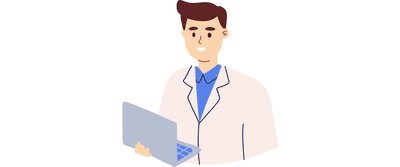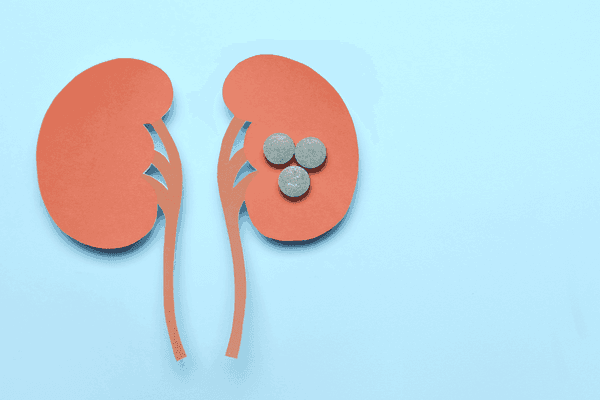![Healthy Matters]() Pharmacist Tips | Dosages | Side effects
Pharmacist Tips | Dosages | Side effects![Healthy Matters]() Nutritionist Tips | Facts | Precautions
Nutritionist Tips | Facts | Precautions![Healthy Matters]() Practitioner Tips | Dosages | Side effects
Practitioner Tips | Dosages | Side effects![Healthy Matters]()
![Healthy Matters]()

Kidney Stones: A Nightmare When Your Urinary Tract Is Blocked
6 min read

Kidney stones, also known as urolithiasis, nephrolithiasis or renal calculi, are deposits of minerals and salts inside the kidneys. It can be a horrible nightmare to the patient as it may cause intense pain, especially when kidney stones move through the urinary tract. Since kidney stones can cause infection and renal function deterioration as a result of obstruction, proper diagnosis and treatment of kidney stones are necessary.
What are Kidney Stones?
Kidney stones are solid deposits formed in the kidneys, which can potentially move along with the urine stream. A kidney stone can potentially block the ureter when it is larger than 5 mm, leading to various signs and symptoms like back pain and hematuria (blood in urine). There are 4 major types of kidney stones categorized by their ingredients:
- Calcium stones: It is, by far, the most common type of kidney stones. They are made of calcium oxalate or phosphate mainly due to a high intake of calcium in the diet.
- Uric acid stones: It is a less common type of kidney stone. They consist of common metabolic uric acid precipitated by acidic urine.
- Struvite stones: Their prevalence is comparable to that of uric acid stones. They are formed by upper urinary tract infections. Infections render urine basic and further precipitate struvite.
- Cystine stones: It is, by far, the rarest form of kidney stones. They are made of cystine as kidneys lose their capability of reabsorbing cystine, leaving a large amount of cystine in the urine.
Causes of Kidney Stones and their Risk Factors
Kidney stones are caused by the precipitation of salts and minerals in the kidneys. Causes of increased mineral content in urine include increased concentration of minerals in the blood, decreased urine flow, urinary stasis, etc. Typical causes and possible risk factors of kidney stone formation include:
- Fluid imbalance: Kidney stones are more readily formed if one has a low urine volume as it increases the concentration of minerals in the urine. Such fluid imbalance can be triggered by decompensated body fluid loss, such as sweating, inadequate fluid intake and strenuous exercise.
- Diet: It has been indicated by studies that improper diets can increase one’s likelihood of having kidney stones. For example, excess consumption of oxalate, fructose, salt and meat induces a higher risk of kidney stone formation.
- Concomitant conditions: Several health conditions may result in a higher risk of kidney stone formation. For instance, patients with chronic urinary tract infections are more likely to develop struvite stones. Those with bowel conditions will have a higher chance of developing kidney stones due to over-absorption of oxalate and/or under-absorption of water.
- Concurrent medications: Certain anti-viral medications may increase one’s chance of developing urinary stones. Therefore, notify your physician of your current medication administration and do not change the regimen at your own discretion.
- Family history of kidney stones: People with a family history of kidney stones are more likely to develop kidney stones.
- Sex: Kidney stones are more prevalent in men than women.
- Ethnicity: Studies indicated that Caucasians are more likely to have kidney stones.
Signs and Symptoms of Kidney Stones
Kidney stones of small size are unlikely to be detected and can be passed out without knowing. However, relatively large kidney stones may show the following noticeable signs and symptoms:
- Immense pain: Such pain occurs at various sites, such as the groin, lateral side of the abdomen, lower abdomen, lower back or the tip of the male penis. Pain induced by kidney stones can be sharp.
- The uncomfortable sensation during urination: When urinating, a feeling of pain and/or burning may be sensed.
- Abnormal urine: Cloudy, pink, red, brown and smelly urine may be observed in patients with kidney stones.
- Nausea and vomiting
Complications of Kidney Stones
Kidney stones may bring about serious consequences if it worsens without proper treatment. Complications of kidney stones may include:
- Increased risk of infection: When the urinary tracts are blocked by kidney stones, metabolic waste would accumulate near the stones and lead to an increased risk of infection, including blood poisoning (septicemia) which can be fatal.
- Urinary retention: Even if the renal calculi pass through the ureter successfully, they may still get stuck in the urinary bladder and block the urethra. Therefore, urine may remain in the bladder and cause much pain.
- Poor renal function: Nephrolithiasis blocks the flow of urine from the kidneys to the urinary bladder, making the kidneys swell painfully and scars would be left on the kidney. These harm the kidneys and result in potential damage to renal functions.
Diagnosis of Kidney Stones
Kidney stones are often detected before it develops into a serious threat. Diagnostic tests of kidney stones include:
- Blood test: A blood test examines the level of substances potentially forming kidney stones, such as calcium and uric acid Blood tests are used to monitor kidney function and identify potential causes of kidney stones.
- Urine test: It can detect the presence of bacteria, which may be associated with stone formation. Detailed urine tests can also measure the urine acidity, evaluate the level of substances which can precipitate into kidney stones.
- Imaging: There are 3 types of imaging tests commonly applied to diagnose urolithiasis. They are CT scan, ultrasound scan and X-ray scan. X-ray scan is the least preferred one as it is not sensitive enough for small kidney stones. CT scan is the most preferred as it is the most sensitive. However, ultrasound is preferable for children and adolescents, as well as for known uric acid stone formers.
Preventions of Kidney Stones
Kidney stones can be painful when they grow to a relatively large size. Therefore, the best way to avoid such pain is to prevent renal calculi. The following measures may help to prevent the formation of kidney stones:
- Adequate hydration: Patients with a history of urinary stones should drink around 2-2.5 L of fluid daily, preferably water with lemon juice added, in order to improve urine flow and decrease the precipitation of minerals in the urine. The approximate target is to produce around 2 L of urine. Upon conditions with high fluid loss, like when sweating a lot in a hot environment, consume more fluid to replenish the loss.
- Proper diet: Avoid diets with high salt content and foods with abundant oxalate and animal protein. A balanced diet which is calcium-rich can reduce the absorption of free oxalate, therefore reducing stone formation. Calcium supplements, if indicated for the treatment of bodily conditions like osteoporosis, can be safely continued.
- Medications: To prevent different types of urolithiasis, various medications may be utilized. Suggested medications to prevent different types of kidney stones are as follows:
- Calcium stones can be prevented by taking thiazides like chlorothiazide and hydrochlorothiazide and phosphates.
- Uric acid stones can be prevented by allopurinol, and possibly with the addition of an alkalizing agent.
Treatments of Kidney Stones
Small kidney stones can pass out the urinary system relatively easily. These measures may aid small kidney stones to pass out through urination:
- Adequate hydration: Increase in fluid consumption improves the urine volume so that drives the kidney stones out more readily. The approximate volume suggested is 2-2.5 L of water daily until stone clearance.
- Medications: Analgesics like ibuprofen and ketoprofen can be taken to reduce the pain associated with stones and their clearance. Antiemetics including metoclopramide and domperidone may also be used to treat nausea and vomiting. Alpha-blockers like doxazosin and prazosin can dilate the ureters and promote passage of kidney stones.
Larger kidney stones can cause immense pain and damage the kidney function. If they cannot be passed out spontaneously, procedures and surgeries are often necessary to aid kidney stones removal.
- Ureteroscopy: During the surgery, the patient would be put to sleep by a general anaesthesia. A fine instrument would be inserted through the urethra and bladder, reaching the ureter. Under direct vision, stones will be fragmented, and this facilitates the stone passage.
- Shockwave lithotripsy: The principle of this non-invasive surgery is to break the kidney stones into smaller pieces with shockwaves, allowing the fragments to pass through the urinary tract. Patients undergo this surgery under light anaesthesia.
- Percutaneous nephrolithotomy: By creating a hole in the back of the body trunk, a fine instrument is placed into the kidney, so that the stone can be fragmented into smaller pieces by laser or ultrasonic energy. This surgery is operated under the effect of general anaesthesia.
FAQs
Yes, it may. Kidney stones can be dislodged more easily through movements, such as jumping, cycling and walking. However, this is only applicable to kidney stones with smaller dimensions. Moreover, exercise not only helps the passage of kidney stones, but also prevents them from forming.
Yes, it does. The citrate in lemon juice prevents small minerals from coming together to form large kidney stones. In order to prevent and treat kidney stones, one may consider drinking 4 ounces of lemon juice together with 2 L of water daily.
To speed up kidney stone clearance, one should start by altering the diet habit. Avoid diets that will further increase the size of a kidney stone, such as a large amount of salt or animal protein consumption. One may also consider drinking more water with lemon juice added, around 2-2.5 L so that they increase the urine volume and flush kidney stones out more easily.
This article was independently written by Healthy Matters and is not sponsored. It is informative only and not intended to be a substitute for professional medical advice, diagnosis or treatment. It should not be relied upon for specific medical advice.

Your health resource, made in Hong Kong
Healthy Matters is Hong Kong’s leading health resource. Our mission is to help you make better health decisions and take control of your health.
Our team of experts is committed to producing reliable health content that is accurate, engaging and relevant, to cover your health & wellness journey from prevention to treatment.
Whether you are looking for trusted information on health conditions, wellbeing or looking for the right doctor or service in Hong Kong, we’re here to help!
Your health matters. Begin your health journey with Healthy Matters today!
































